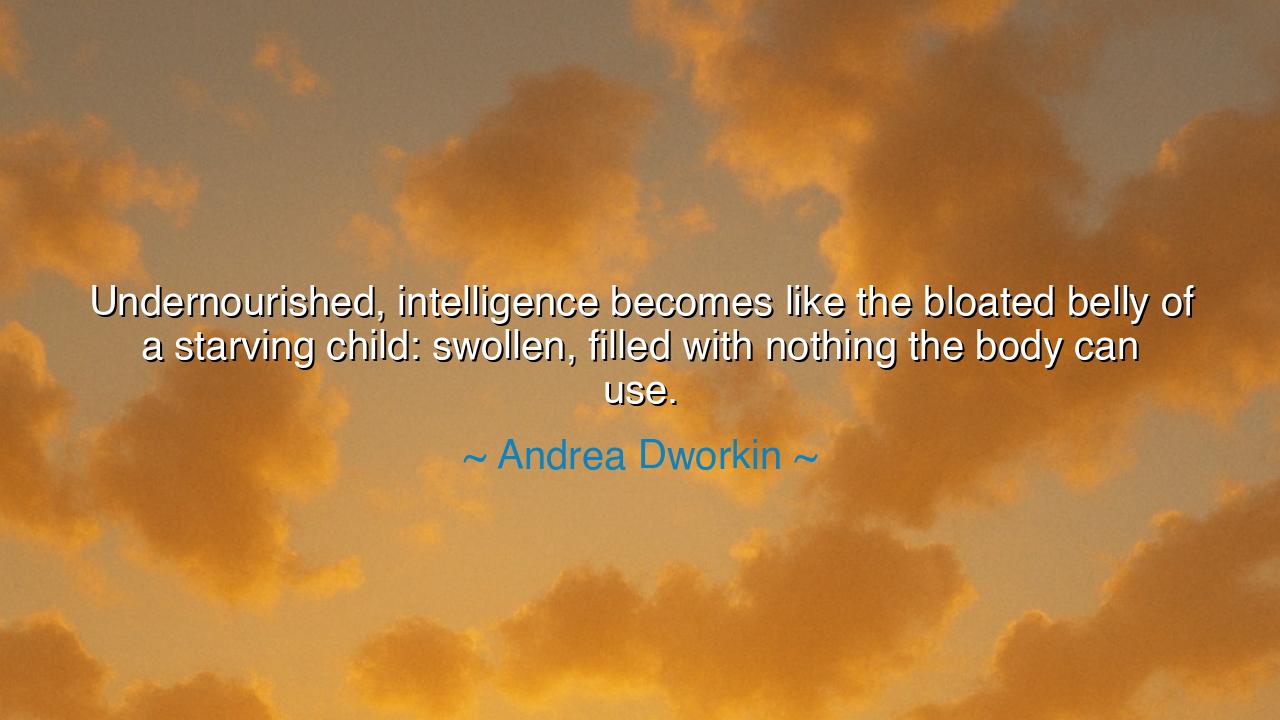
Undernourished, intelligence becomes like the bloated belly of a
Undernourished, intelligence becomes like the bloated belly of a starving child: swollen, filled with nothing the body can use.






When Andrea Dworkin wrote, “Undernourished, intelligence becomes like the bloated belly of a starving child: swollen, filled with nothing the body can use,” she did not write as a philosopher gazing down from abstraction, but as a prophet crying from the depths of human suffering. Her words strike the soul like a blade — vivid, haunting, and unflinchingly true. She draws a picture of intelligence not as a blessing, but as a tragedy when deprived of substance and nourishment. It is an image that forces us to confront a grim paradox: that the mind, like the body, can grow distorted when it is starved of truth, compassion, and moral courage.
The origin of this quote lies in Dworkin’s lifelong battle against the deceptions of culture — especially those that silence, exploit, and cheapen the human spirit. As a radical feminist writer, she exposed how societies praise intelligence but often feed it lies. She saw that many intelligent people become hollow — trained to argue, to perform, to repeat the ideologies of power — yet unable to think deeply or act justly. Like a child whose belly swells from hunger because the body devours itself, so too does the intellect bloat when it feeds only on vanity, ambition, and imitation. Her words warn us that knowledge without nourishment — without wisdom, empathy, and truth — becomes poisonous to the soul.
To understand her meaning, imagine the starving child she evokes — a being betrayed by the very system that should sustain it. The child’s belly is swollen not with food, but with emptiness; the organs fail while the form deceives the eye. It is an image of false fullness, of appearance without substance. So too is the modern intellect when it consumes information without reflection, when it fills itself with data but no understanding, with opinions but no integrity. The world today brims with intelligence — yet lacks wisdom. We have knowledge that can split the atom and map the genome, but not the moral vision to use it rightly. Thus, Dworkin’s metaphor transcends her time: it speaks to all ages when cleverness outpaces conscience.
History offers us many such examples. Consider the fall of Nazi Germany, a nation of scientists, poets, and philosophers — a nation of astonishing intelligence, but starved of humanity. There, intellect served cruelty; knowledge was perverted into tools of destruction. The brilliant became monstrous because their minds were undernourished by empathy, justice, and love. Dworkin’s words could have been carved into the walls of that era: intelligence, when cut off from the nourishment of compassion, becomes grotesque — swollen with emptiness, powerful but useless, impressive but hollow.
And yet, her warning is not only political — it is deeply personal. Each of us must ask: what nourishes my intelligence? What do I feed my mind? Do I seek truth, or merely validation? Do I pursue understanding, or only victory in argument? The human mind, like the body, grows by what it consumes. Books, art, conversation, contemplation — these are its food. But when we fill it only with noise, distraction, or self-righteousness, our intelligence becomes diseased. We may seem clever, but our thoughts will lack vitality, creativity, and moral power. The greatest intellects — from Socrates to Simone Weil — understood that the mind must be fed by humility and wonder, or it will die of its own arrogance.
In this way, Dworkin’s image is not only a warning, but a summons. She calls us to nourish the intellect as one would tend a sacred fire — with patience, honesty, and reverence. To feed it not with empty slogans or fashionable thoughts, but with genuine inquiry and courage. True intelligence is not a contest of cleverness, but a practice of seeing clearly — of discerning truth even when it is uncomfortable, of listening to the voices of the silenced, of joining knowledge with compassion. When mind and heart are joined, intelligence becomes nourishment for the world; when they are divided, it becomes famine.
So, my child, heed this lesson: let your intelligence not grow swollen on vanity, but strong on truth. Seek learning that humbles you, not knowledge that glorifies you. Fill your mind as the wise fill their gardens — not with weeds that grow quickly and choke the soil, but with roots that take time, that draw sustenance from depth. Read widely, think slowly, love deeply, and question bravely. For as Andrea Dworkin teaches, it is not enough to be intelligent — one must also be nourished. Feed your mind with wisdom, your heart with empathy, and your actions with justice, and you will never become swollen with emptiness, but radiant with light.






AAdministratorAdministrator
Welcome, honored guests. Please leave a comment, we will respond soon